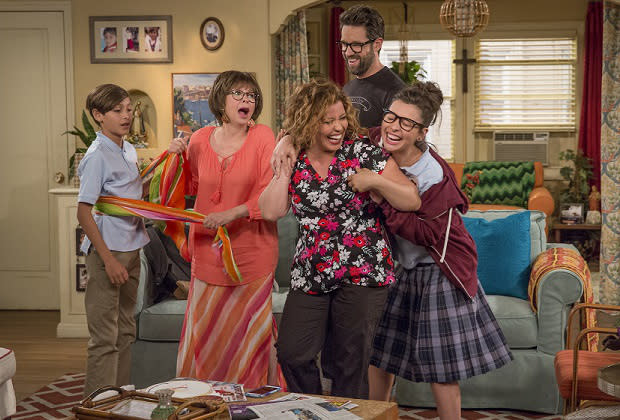‘One Day at a Time’ Returns, Warmed and Transformed

In a new Netflix reboot, the 1970s sitcom One Day at a Time has been reimagined as the story of a Cuban-American family in present-day Los Angeles. It’s warm, it’s goodhearted, it sends out positive messages. What it isn’t is funny.
This One Day, whose 13 episodes begin streaming on Friday, stars Justina Machado as Penelope Alvarez, a 38-year-old single mom who’s also a nurse and an Afghanistan War veteran. She lives with her two children, played by Isabella Gomez and Marcel Ruiz, and her mother, Lydia, played in a showcase star-turn by Rita Moreno. And remember the original show’s randy handyman, Schneider, played by Pat Harrington Jr., who died just last year? Well, the new Schneider’s been refashioned into a young stud played by Todd Grinnell.
The show has been reconceived by veteran producer Norman Lear along with producers Gloria Calderon Kellett and Mike Royce to accommodate debates about such topics as immigration and deportation, the struggles of our armed-services veterans, and the efficacy of antidepressants. Too often, the show is like a Bill O’Reilly “Talking Points Memo,” but with reverse-politics and a laugh track. (Come to think of it, O’Reilly’s “Memos” could use a laugh track.)
In between groaning rib-ticklers about rebellious teenagers and Uber drivers, the show manages to stage arguments about stuff as heavy as the very existence of God — or, at least, the superiority of Catholicism. The studio audience — helped a little by some laugh track sweetening, most likely — guffaws uproariously when Lydia puts a picture of the pope on the refrigerator. When Penelope invokes the word “Protestant,” devout Catholic Lydia yells, “There is no need for name-calling!”
The show wants to have it both ways, playing up to various cultural stereotypes while insisting that this family defies stereotyping. There are loads of jokes that play off of Lydia’s pronunciation of certain words. When Lydia applies a beautifying sheet mask, much is made of how much it sounds like a certain four-letter word, with yuks about how “the sheet will hit the fan.”
The cast is good, with the obvious standout being Moreno, who plays her broadly drawn character so lustily, it’s a wonder she doesn’t wink at the camera and then just walk up and give it a big wet kiss. Moreno’s outsized talent is well-deployed. On the other hand, the excellent character actor Stephen Tobolowsky is squandered in the trite role of Penelope’s doofus boss.
Norman Lear has produced a lot of good television over the decades. My personal ranking of his best would be Maude, The Jeffersons, and All in the Family, with both Mary Hartman, Mary Hartman and Fernwood 2 Night shuffled somewhere in there as well. I vastly prefer the harder-edged ethnic humor that emanated from characters like Sherman Hemsley’s George Jefferson and John Amos’s James Evans in Good Times to the sentimental-leaning creations in the new One Day at a Time. But for a lot of people, it may be enough to have such a warm, loving Cuban-American family portrayed in a sitcom, a format that has not presented people from such a culture with much understanding in the past.
One Day at a Time begins streaming Friday on Netflix.

